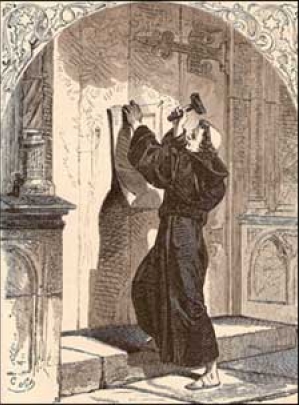
Today marks the 496th anniversary of the day that Martin Luther nailed his 95 Theses to the door of a Roman Catholic Church in Wittenberg, Saxony, protesting the selling of indulgences and the ability of the Pope to absolve sins. The reformation that followed effectively divided the Western church into the Protestant and Catholic denominations of Christianity.
Dr. Martin Luther, the Catholic priest and German monk known as the father of the Protestant Reformation, perhaps didn't intend be the catalyst for a schism in the church when he confronted leadership about some of its practices on October 31, 1517. John Wycliffe and Jan Hus had also previously attempted to reform the Church, and prominent theologians such as John Calvin supported Luther's efforts thereafter.
"Reformation Day is ripe for remembering an array of biblical truths - that the Scriptures are our only final authority (sola Scriptura); that God accepts us by grace alone, through faith alone, on the basis of Christ alone (justification); that God often uses the unlikeliest of people to turn the world upside down; that God doesn't just raise up great individuals, but collections of people, veritable teams, each with his lot, and his own local cohort, to bring about widespread change; and all these conspiring to the glory of God alone (soli Deo gloria)," writes David Mathis from DesiringGod.org.
On the night before All Saint's Day, the German priest nailed his objections to a Roman Catholic Church door, addressing his protest to the Archbishop of Mainz. Luther's theses mainly addressed indulgences, purgatory, and the authority of the Pope to absolve sin. The Catholic Church had begun to sell indulgences to their followers, claiming that people could be forgiven for their sins by purchasing them. Appalled at the thought that many would trust in indulgences for their salvation, he protested that the Pope had no authority to remove men's sin. We must instead rely solely on Jesus Christ's life, death, and resurrection for the forgiveness of our sins - a free gift to us from God, which cost Jesus His life.
"The Pope himself cannot remit guilt, but only declare and confirm that it has been remitted by God," Luther wrote. He warned that those who "believe themselves certain of their own salvation by means of letters of indulgence, will be eternally damned, together with their teachers." According to Geoffrey Saint-Clair from Catholic.net, the practice of indulgences in that day was not according to official Catholic doctrine. He believes that the leadership of the Church were in part to blame - "The popes themselves failed to reform the Church, even when they were in a position to do so. And when the Reformation eventually broke out, the papacy failed to understand the challenge to the Church and failed to act quickly to address the problems that gave rise to it. At the same time, when the Church finally did get around to reform, the papacy helped lead the way," he says.
Luther soon afterward translated the Bible into German in an effort to make the Scriptures more available to the common people. The printing press had recently been invented, and served as a major help to the Reformation as Bibles and pamphlets of Luther's 95 Theses were widely distributed in Europe. In the years following, Luther wrote several other documents concerning Roman Catholic doctrine and practice, including opposition to the veneration of Mary, the sacraments, the devotion to particular Catholic saints, and the Church's requirement for priests to remain celibate. He was excommunicated from the Catholic Church in 1521.
When someone asked on behalf of the Emperor whether Luther would stand by his 95 Theses, he prayerfully responded:
"Unless I am convinced by the testimony of the Scriptures or by clear reason (for I do not trust either in the pope or in councils alone, since it is well known that they have often erred and contradicted themselves), I am bound by the Scriptures I have quoted and my conscience is captive to the Word of God. I cannot and will not recant anything, since it is neither safe nor right to go against conscience. May God help me. Amen."






